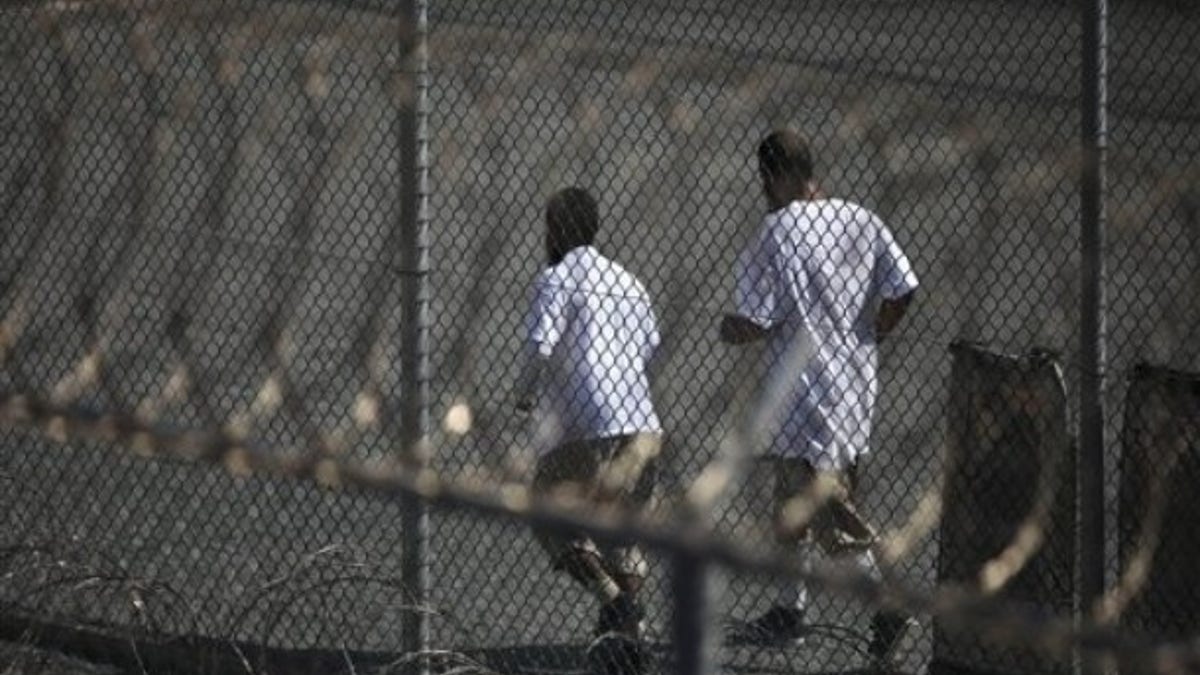
In this photo, reviewed by the U.S. military, Guantanamo detainees jog together inside a recreation area at Camp 6 high-security detention facility at Guantanamo Bay U.S. Naval Base, Cuba, Tuesday, March 30, 2010. (AP)
WASHINGTON – The Obama administration has taken "operational" steps to move five Taliban leaders from Guantanamo Bay as part of a confidence-building measure to further peace talks with the Afghan Taliban, the chairman of the House Intelligence Committee said at a hearing Thursday on national security threats.
The five detainees were said to be "hand-picked" by the Taliban preparing for the talks.
"There have been operational things that have been conducted up to this point, so this isn't an aspirational policy change," Rep. Mike Rogers, R-Mich., chairman of the House Intelligence Committee, said Thursday. "This is something that is well underway and has been, at least a suggestion, has been passed along to the very people that we would like to negotiate with."
The Taliban transfer issue was a significant focus of the hearing on worldwide threats. Rogers said ahead of the hearing that the administration’s efforts to talk with the Afghan Taliban smack of “desperation.”
“Candidly, I don’t like the direction they are going in (with) reconciliation,” Rogers said. “I base it on the things that I know about how the Taliban works. The tribal relations in the region, and I’ve been on the committee for six years looking at this stuff ... it seems like a bit of desperation to try to catch up to their policy of ‘we’re getting out.’”
As for the administration’s prisoner transfer plan, a senior congressional official who spoke to Fox News on the condition of anonymity confirmed money had been spent to send the men, as part of the current strategy, to a third country. The official added that the administration tried to tamp down concern by saying they would not swap all five Taliban leaders at once; rather, three now and the others later.
“They (the administration) have taken operational steps to make it happen," the source said.
The White House denied that any resources had been committed to such a transfer.
"We haven't committed any resources," White House spokesman Tommy Vietor said. "We've engaged in diplomatic efforts alone, and we've consulted with Congress and will continue to do so. In absolutely any case, our efforts will be consistent with U.S. law."
On Wednesday, Defense Secretary Panetta said the U.S. could end its formal combat role in Afghanistan 18 months from now.
Rogers told Fox News that the Obama administration has put the cart before the horse in an effort to meet its political objectives. Prisoner swaps are usually dealt with after the peace terms are settled. Given the U.S. wants to be out of Afghanistan altogether by the end of 2014, the Taliban is in no hurry to negotiate.
They understand that the longer they wait, the weaker the U.S. bargaining position gets over time, Rogers said.
The Taliban "are notoriously good at this," Rogers said. "When I say good at it, I mean using any type of negotiation process to re-establish themselves in a better place when it's done."
In a series of classified meetings since the end of last year as well as in a series of letters sent by Reps. Dana Rohrabacher, R-Calif., Louis Gohmert, R-Texas, and Steve King, R-Iowa, the administration was told there was strong bipartisan opposition to the transfer of the Taliban Five from Guantanamo Bay as part of confidence-building measures to engage the Afghan Taliban in peace talks, Rogers said.
Referring to a Senate intelligence hearing Tuesday with senior officials from the administration, Rogers said the contentious debate was now out in the open.
"They said it on the record, yes, that is part of the talks. This is a really bad idea. And we have told them that. And it has been bipartisan. There is no way they could walk out of any of those meetings thinking they had some support coming out of the U.S. Congress."
As part of the Senate hearing, the head of the national counter-terrorism center, Matt Olsen, confirmed that 48 detainees were deemed too dangerous to release during the administration's 2009 review of the Guantanamo Detention camps. The five Taliban detainees are among them.
"The Taliban asked for them specifically,” the senior congressional official said. “These are serious players in their organization. We believe they all have U.S. blood on their hands. And the IC (intelligence community) has determined that all five were too dangerous to be released. The IC did not make that determination based on this exchange. They based it on -- don't give them back ever! "
On Tuesday, the Ranking Republican on the Senate Intelligence Committee, Saxby Chambliss, asked the administration’s top intelligence adviser if he was “comfortable with transferring these individuals out of Guantanamo?"
Director of National Intelligence James Clapper seemed to inadvertently divulge details of the administration’s strategy by stating the men may be sent to a third country as part of the deal.
“For me, the key would be where they would go, the intermediate country that they -- where they might be detained, and the degree to which they would be watched. And that would be the key determinate for me," Clapper said in the Senate hearing.
Fox News chief intelligence correspondent Catherine Herridge's bestselling book "The Next Wave: On the Hunt for Al Qaeda's American Recruits," published by Crown, draws on her reporting for Fox News into Al Qaeda 2.0 and it investigates the Obama administration’s controversial handing of the Guantanamo Bay detention camps and the stalled prosecution of the 9/11 case.
























